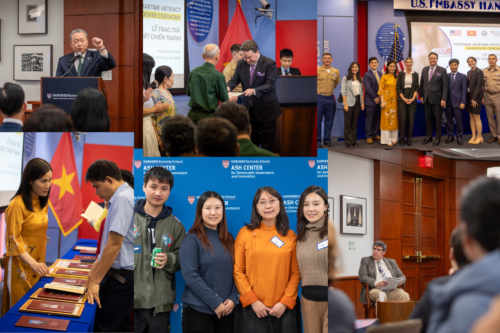Heading into this meeting, the first between Presidents Trump and Xi, how would you describe the current state of Sino-American relations?
Relations are probably at their most unsure for many years. China’s development has raised differing interpretations within the U.S. about how to deal with its rise. The divide is between those who favor continuation of the policies of engagement to integrate China into the global order with the hope that this will condition China’s behavior to conform with international norms. By contrast, there are those who feel that China’s rise has now become the most significant challenge to the U.S. position and its ability to set the global norms for areas such as trade and investment. This played out in the election campaign with candidate Clinton tilting towards the former and candidate Trump towards the latter. President-elect Trump staked a position of strong opposition to China’s rise and threatened to challenge it in significant ways. President Trump has moderated this view somewhat but still remains concerned about China’s development, the trade gap, currency manipulation and its territorial claims in the seas that surround it and the associated military developments. Thus, until the two leaders meet it is difficult to estimate exactly where the relationship stands.
Trump publicly criticized China’s trade and military policies while on the campaign trail. Notably, he accused China of manipulating its currency and essentially stealing American jobs. Trump even raised the specter of revisiting the one China policy. In response, China has accused Trump of “stirring up unnecessary trouble.” How badly, if at all, has Trump damaged his relationship with Xi Jinping?
Certainly, these actions and comments caused great concern in China. Initially, the response from China was moderate, suggesting that he was inexperienced and would shift his position once he became President and settled in. This has been their experience with other Presidents taking up their position. Briefly it turned to alarm as he did not appear to conform to type but once again was reassured by the comments of Secretary of State Tillerson that seemed to accept China’s viewpoint on the nature of the relationship and that there was only one China. That said, to date I do not think that Trump has a relationship yet with Xi and this may develop at the meeting between the two. If Trump keeps to the script that Tillerson set in Beijing, then I think the Chinese will be happy. Whether he does this in the meeting and the follow-up tweets is unknown.
Is President Xi concerned about the unpredictability of President Trump and his willingness to shift positions on a whim? What does this portend for trust building between the two leaders?
In some ways he is unpredictable but in other ways not. He has been consistent in his views on trade and the currency and he has called for a large increase in defense spending. His most recent tweets have again highlighted his views on the trade deficit. Other issues such as the “One China Policy” and Taiwan more generally have seemed less important to him and thus subject to whim and fancy at any particular time.
Are Trump’s plummeting poll numbers and legal and legislative defeats of late likely to factor into President Xi’s posture toward the new U.S. administration?
I think that the Chinese have become more sophisticated in terms of understanding the American political system. As a result, they will be looking more closely at how the Republicans are likely to fare in mid-term elections. I would think that Trump’s declining support may boost Xi’s sense that he is the premier leader on the world stage and that Trump may well be hampered in implementing any significant policy changes that would hurt China. We have two leaders meeting who both have huge egos and it will be interesting to see how they respond to one another. I do not foresee a Reagan-Gorbachev moment coming out of this. Rather than the actual meeting and the announcements made, it will be more important to watch for the post-meeting tweets.
What do you think Trump and Xi respectively hope to achieve with this meeting?
For Trump, given his policy frustrations to date, he will want to come out of the meeting with something positive. Most important will be that he can show some progress on trade and perhaps showcase the possibility for Chinese investment that will create jobs in the U.S. Xi might be willing to consider this. However, it is quite clear that it is not China that is stealing US jobs but rather technology that is taking jobs. Most studies show that as much as 80 percent of job loss in U.S. manufacturing is because of improved efficiency and technological advances, not trade patterns. Further, U.S. investment in China is integrally connected to global production chains in a way that Chinese investment in the U.S. is not. U.S. firms benefit greatly from this. Thus, any trade war would be problematic for the U.S.



